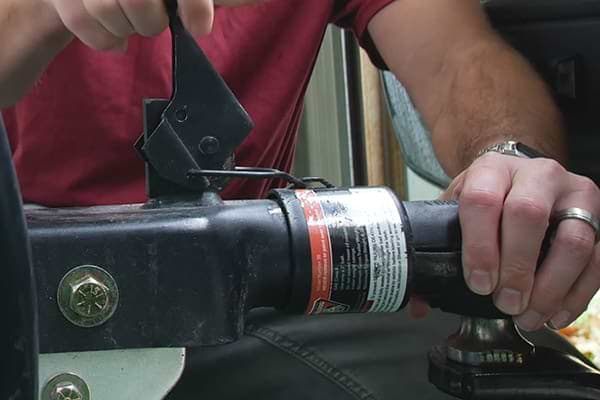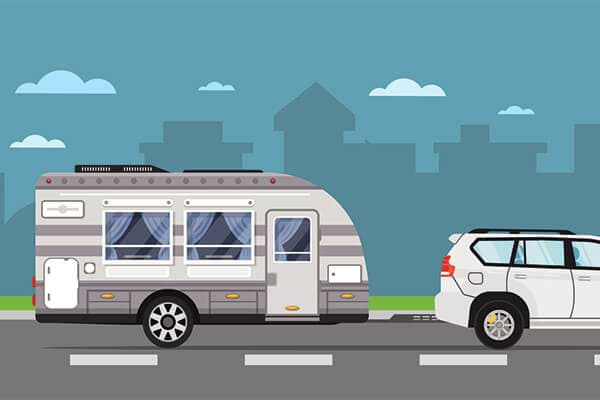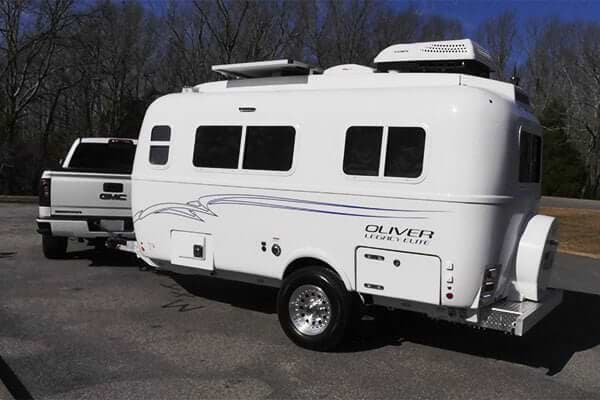Camper 101: Towing Safety
We have compiled some great Towing Tips to help you with your travels!
While setting off on a travel expedition in your travel trailer is enticing, towing it can be daunting. The process may not entirely be nerve-wracking, but it is a step up in complexity from driving a solo vehicle, and it also requires you to practice maneuvers before you begin piloting the big rig.
If the trailers are not properly set up, loaded, and maintained, a lot of trouble can ensue on the road. Each year, several accidents are caused by RV drivers and are attributed to a lack of knowledge about proper towing procedures. Hence, you shouldn’t risk this. Before you set out on your best camper adventure, here are a few towing tips to ensure safety on the road.
1. How to Hitch Your Travel Trailer

First things first, hitching the camper to your wagon accurately is indispensable. When purchasing a hitch, check the label to determine if it can lug the weight of the travel trailer. Also, review your vehicle’s towing capacity. A weight-distributing hitch is always the best choice, as it can safely handle the load and help improve safety on the road!
The front of the trailer, which hitches to the truck, is known as the tongue and incorporates a coupler in which the hitch ball is to be inserted. Raise your travel trailer on a jack and drive your vehicle in reverse so the hitch ball and the trailer coupler are in line. Put your towing truck in park and turn on the parking brakes. Lower the travel trailer onto the hitch ball and activate the locking mechanism.
Once your trailer is seated, plug its wires into the electrical outlet of the vehicle and crisscross the safety chains, loose enough to allow slacks at turns but tight enough to not drag so that if the hitch comes off, the trailer will drop onto the chains instead of on the ground.
2. Camper Weight Distribution

Bulking up the travel trailer irregularly causes it to sway and lose balance. To gain more control over your trailer, it is imperative to distribute the weight evenly from side to side to lower the center of gravity. Also, the cargo weight should be spread lengthwise from the front of the trailer to the back. Secure hefty items within the travel trailer to prevent them from shifting places during travel. To ensure a hitch-free ride, ensure your trailer is aligned with your towing vehicle and is parallel to the ground.
For examples please visit this video.
3. Trailer Braking System
Your travel trailer’s brakes and brake lights should be in sync with those of the towing vehicle. The heavier your trailer, the greater the momentum, which makes braking more dangerous and extends braking distances. Electronic or hydraulic braking mechanisms activate the brakes on a travel trailer.
Electrical brakes start with a gradual braking application, and the longer you hold your foot down on the pedal, the more it ramps up the tension on the brakes. This lets you gently slow down without losing control of your trailer and prevents trailer-wheel lockup. To comply with this principle, you must give your trailer plenty of time and space before you ease up at stop signs. Allow ample space between your rig and the nearby vehicles if you need to pull over suddenly, which could result in a calamity.
Overusing the brakes can lead to overheating and, ultimately, a brake fade. In this case, friction causes the heating up of braking pads and a temporary loss of braking. Prevention is the key when out on the road. Downshift your gear to impede speed sufficiently so that the brakes are not used unnecessarily and preserved for emergencies. Slowing down also prevents your trailer from flipping or skidding during braking.
4. Backing Up a Trailer

Backing up a trailer like a pro is one of the hardest tricks in the book and can prove exasperating for a first-time tower. Use these tips while backing up on the road:
- The robust proportion of the trailer may block your view, so have someone stand outside and guide you whenever possible.
- Put your hand on the bottom of the steering wheel. Move your hand towards the left to turn left, and similarly, move your hand right to turn.
- Use subtle steering wheel movements to adjust directions, as exaggerated actions can cause greater movements than intended.
- Make sure that your trailer and towing truck are aligned. Otherwise, pull forward, realign, and begin again.
5. Parking a Travel Trailer
Your rearview mirror is not the best guide in a camper trailer, so it is prudent to ask someone outside to guide you while parking. Ask someone to put blocks on the downhill side of the trailer wheels. Shift into park, apply the parking brakes, and let go of the braking pedal gently.
If this sequence is not followed, your vehicle risks becoming locked in the park because of the extra load. Putting blocks behind the tires prevents them from rolling. If you need to uncouple your trailer from the towing vehicle, stick blocks to the front and back tires of the trailer before you release the coupling to prevent it from rolling away.
6. Inspect in Between
Each time you pull over, inspect your travel trailer and scrutinize the condition of the hitch, wiring, and tires. Check that the hitch is secured to the tow vehicle and the coupler is attached to the trailer. Your light bulb sockets, connector plug prongs, receptacles, and ground connections should be clean and moisture-free.
Check for glitches in the braking systems and rectify any anomalies you find. Thump the tires to check the inflation level. Overinflated tires wear prematurely, and underinflated tires diminish the trailer’s load-carrying capacity and cause it to undulate and lose control.

